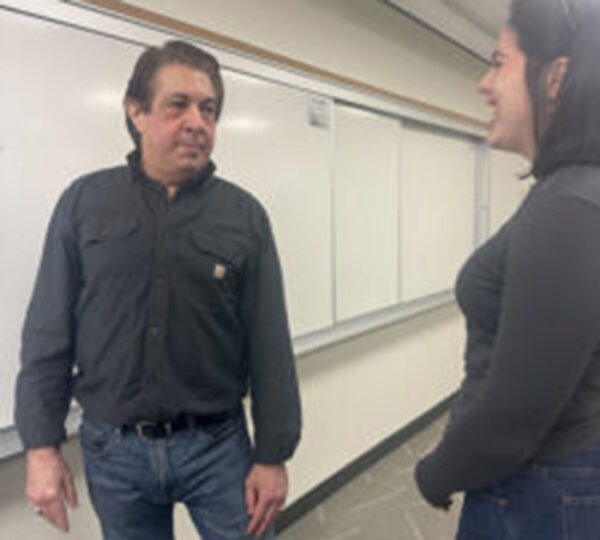Technological Literacy: The Must-Have Skill for the Future of Work

As artificial intelligence transforms industries and upends traditional workflows, one thing is clear: technological literacy is no longer optional—it’s the must-have skill for thriving in the future of work.
Whether you’re a recent graduate, a mid-career professional, or a seasoned executive, understanding emerging technologies, especially artificial intelligence (AI), is rapidly becoming a requirement for professional survival and business competitiveness.
“We’re way past the point where AI is just a buzzword,” said Mike Grandinetti, who teaches the course Mastering Generative AI in Your Business as part of Babson’s Professional and Executive Education portfolio. “Technological literacy is now a core leadership competency, not just something for engineers or coders.”
The World Economic Forum listed tech literacy as one of the top essential skills for the workforce in its 2025 Future of Jobs Report. Tech literacy, or the ability to effectively use, understand, manage, and evaluate technology, involves possessing technological knowledge, understanding the techniques, and using them capably.

Grandinetti, an AI expert and industry fellow at Babson Professional and Executive Education, has watched the rapidly shifting labor market firsthand, where even entry-level jobs in prestigious fields such as investment banking, public accounting, and management consulting are vanishing or being redefined to require two to five years of professional experience and a high level of proficiency with generative AI tools.
Meanwhile, emerging technologies such as agentic AI—AI systems capable of completing multi-step tasks independently—are beginning to replace the traditional “grunt work” that many roles once required.
“The teams of the future are going to be hybrid teams,” Grandinetti explained. “And that doesn’t just mean remote workers. It means humans working alongside AI agents. You’ll be interviewing candidates who show up and say, ‘Me and my 10 AI agents are ready to go.’ ”
Why Tech Literacy Is Business Literacy
For Jonathan Sims, associate professor of strategic management and leader of The Generator‘s AI & experiential learning specialty lab, understanding technology is about more than gaining 21st century skills—it’s about staying curious, adaptive, and strategically literate.
“We’ve moved from a world where AI was just something you read about, to a place where it’s something you interact with every day. If you don’t know how to use it, you’re not just behind—you’re at a disadvantage,” Sims said.
Sims and others at The Generator feel it’s important to integrate information and communications technology and artificial intelligence skills into every domain. Tools such as deep research agents and vibe coding (AI-driven app prototyping through natural language) have become game-changers for entrepreneurs and professionals alike. The tools let non-coders create working product prototypes in hours, conduct market research in minutes, and gain domain-specific expertise previously accessible only to specialists.
“Building useful AI systems no longer requires knowing how to code,” Sims emphasized. “But it does require curiosity – staying current on the various ways AI can be used to enhance your strategic thinking—those are the 21st-century skills we need to be teaching.”
The New AI Skills Stack

Artificial intelligence skills now span a wide range of competencies. At the baseline are prompting skills—knowing how to interact effectively with AI tools such as ChatGPT or Claude. More advanced users learn how to use agentic AI to automate workflows or conduct “deep research” across thousands of sources.
And then there’s vibe coding, which eliminates the need to know traditional programming languages. Instead, users describe what they want in natural language, and the AI builds it.
“Whether you’re trying to prototype a product, diagnose a business problem, or even create a personal learning road map, AI is the co-pilot that lets you go faster and further,” said Sims.
For mid-career professionals who may feel left behind, both professors offer a message of empowerment. “If you can speak and type, you can use AI,” said Grandinetti. “We’ve taught construction executives, medical professionals, and insurance leaders how to integrate these tools. Once they see what’s possible, it’s like giving someone a superpower.”
Lifelong Learning as a Strategic Imperative
The call for technology skills isn’t just academic—it’s urgent. Companies such as Shopify, Duolingo, and Fiverr have declared themselves “AI-first,” meaning new hires are only made if AI can’t do the job.
At the recent annual Aspen Ideas Festival, Ford Motor Company CEO Jim Farley issued a stark warning on the future impact of AI within the company and on the broader U.S. workforce that received widespread media attention. His message? AI is likely to drive deep changes in corporate workforce structure.
“Lifelong learning isn’t a nice-to-have anymore. It’s essential if you want to stay employed, much less stay competitive.”
Mike Grandinetti, industry fellow at Babson Professional and Executive Education
“The future belongs to the curious,” said Grandinetti. “Lifelong learning isn’t a nice-to-have anymore. It’s essential if you want to stay employed, much less stay competitive.”
Babson’s Professional and Executive Education courses are designed with this urgency in mind. The goal is to empower learners to adapt, experiment, and lead in an era defined by exponential change.
As Sims put it, “We’re writing our own syllabi now. AI can help us fill the gaps in our knowledge and open up entirely new fields of possibility. But only if we choose to stay curious.”
LEARN MORE about Babson’s Professional and Executive Education portfolio, including live-online, Babson On-Demand™, and blended courses for individuals; leadership development programs for organizations; opportunities for advanced students and educators at Babson Academy; and government leadership programs.
Posted in Insights




